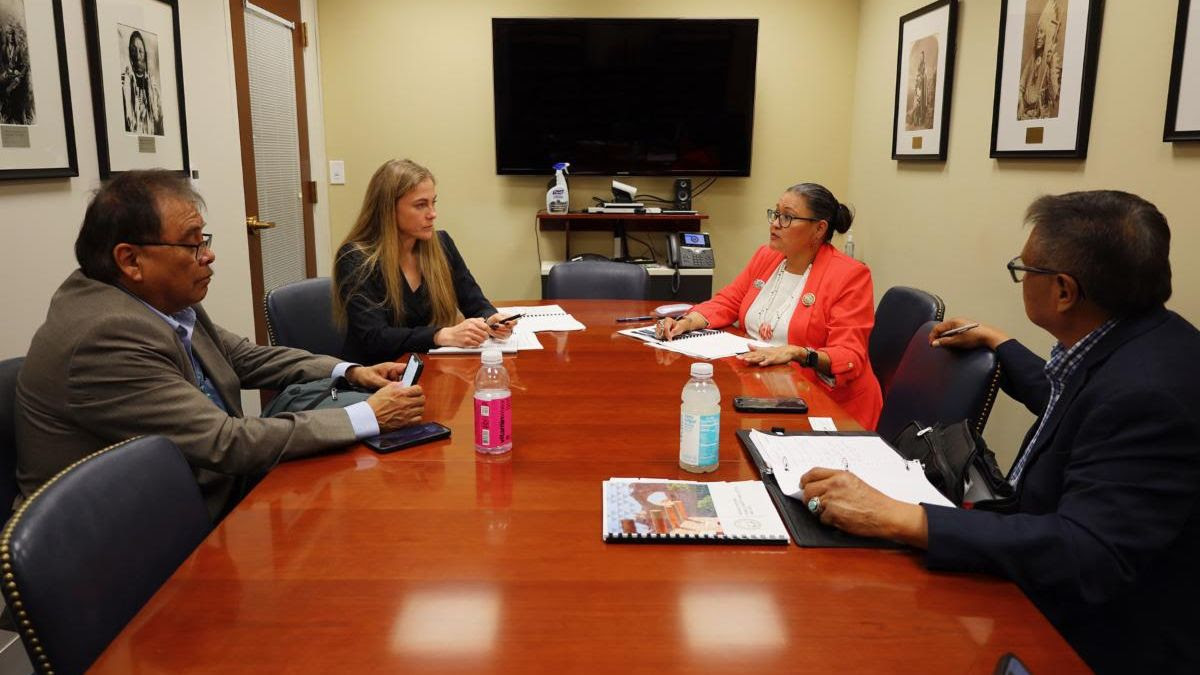
- Details
- By Native News Online Staff
During National Police Week (May 12–16), the Law and Order Committee (LOC) seized the opportunity to travel to Washington, D.C., and engage with federal lawmakers to advocate for the Navajo Nation’s public safety and justice priorities.
Key topics of discussion included the need for mandatory funding for the Bureau of Indian Affairs (BIA) under the Department of the Interior, increased staffing for Navajo law enforcement, the potential impact of proposed federal budget cuts, and concerns about federal prosecution decisions.
In meetings with staff from Senator Lisa Murkowski (R-AK), Chair of the Senate Committee on Indian Affairs (SCIA) Majority, and Senator Brian Schatz (D-HI), Vice Chair of the SCIA Minority, LOC Chair Eugenia Charles-Newton emphasized the disparities in law enforcement coverage across the Navajo Nation.
“The national average is 2.8 officers per 1,000 people,” said Charles-Newton. “To meet that standard, the Navajo Nation would need 560 officers to patrol our 27,000 square miles within the Navajo Nation. We currently have only 218 due to insufficient funding. To properly serve our people, we need to double our police force and criminal investigators.”
Chair Charles-Newton urged the SCIA to support mandatory spending for the BIA’s Office of Justice Services, which funds tribal public safety and justice programs. She emphasized that unreliable federal support forces tribal law enforcement to anticipate funding shortfalls, often leading to staff reductions.
When meeting with Senator Ben Ray Luján (D-NM), Council Delegate Arbin Mitchell expressed concern over the White House’s proposed “Skinny Budget,” which would reduce funding for tribal public safety and justice by $107 million.
“The Skinny Budget also proposes cuts to the Departments of Health and Human Services, BIA, Bureau of Indian Education, and would eliminate the Low-Income Home Energy Assistance Program,” said Mitchell.
Council Delegate Nathan Notah noted that these cuts would exacerbate already significant challenges in improving public safety on the Nation.
“These reductions would force tribal nations to compete for fewer resources,” Notah said.
Chair Charles-Newton, who co-chairs the Public Safety and Justice Subcommittee of the Tribal Interior Budget Council (TIBC), told Senator Martin Heinrich’s (D-NM) staff that TIBC ranked public safety and justice funding as its second-highest priority.
“If Congress follows this proposal, we’ll have even fewer officers,” said Charles-Newton. “The cuts will also impact the operation and maintenance of BIA facilities. We need funding for new public safety buildings and to remove old, unsafe ones.
More Stories Like This
Native News Weekly (August 25, 2024): D.C. BriefsNavajo Nation Mourns the Passing of Former Vice President Rex Lee Jim
Deb Haaland Earns Endorsement From Communications Workers of America Local 7076
University Soccer Standout Leads by Example
Two Native Americans Named to Democratic Congressional Campaign Committee's“Red to Blue” Program
Help us defend tribal sovereignty.
At Native News Online, our mission is rooted in telling the stories that strengthen sovereignty and uplift Indigenous voices — not just at year’s end, but every single day.
Because of your generosity last year, we were able to keep our reporters on the ground in tribal communities, at national gatherings and in the halls of Congress — covering the issues that matter most to Indian Country: sovereignty, culture, education, health and economic opportunity.
That support sustained us through a tough year in 2025. Now, as we look to the year ahead, we need your help right now to ensure warrior journalism remains strong — reporting that defends tribal sovereignty, amplifies Native truth, and holds power accountable.
 The stakes couldn't be higher. Your support keeps Native voices heard, Native stories told and Native sovereignty defended.
The stakes couldn't be higher. Your support keeps Native voices heard, Native stories told and Native sovereignty defended.
Stand with Warrior Journalism today.
Levi Rickert (Potawatomi), Editor & Publisher


